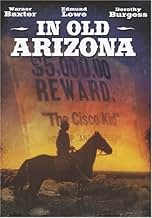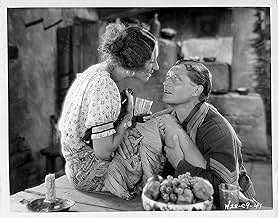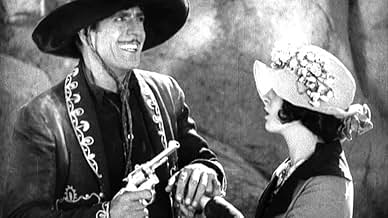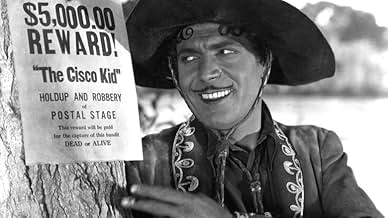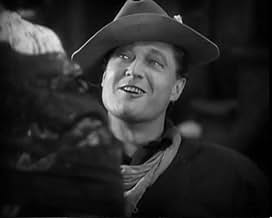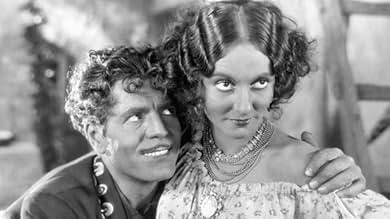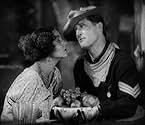IMDb RATING
5.5/10
1.4K
YOUR RATING
A charming, happy-go-lucky bandit in old Arizona plays cat-and-mouse with the sheriff trying to catch him while he romances a local beauty.A charming, happy-go-lucky bandit in old Arizona plays cat-and-mouse with the sheriff trying to catch him while he romances a local beauty.A charming, happy-go-lucky bandit in old Arizona plays cat-and-mouse with the sheriff trying to catch him while he romances a local beauty.
- Won 1 Oscar
- 4 wins & 4 nominations total
Henry Armetta
- Barber
- (uncredited)
James Bradbury Jr.
- Soldier
- (uncredited)
Frank Campeau
- Man Chasing Cisco
- (uncredited)
John Webb Dillion
- Second Soldier
- (uncredited)
Alphonse Ethier
- Sheriff
- (uncredited)
Jim Farley
- Townsman
- (uncredited)
William Gillis
- Guard
- (uncredited)
Pat Hartigan
- Cowpuncher
- (uncredited)
Soledad Jiménez
- Tonita the Cook
- (uncredited)
Ivan Linow
- Russian Immigrant
- (uncredited)
Tom London
- Man in Saloon
- (uncredited)
Helen Lynch
- Stagecoach Passenger
- (uncredited)
J. Farrell MacDonald
- Stage Passenger
- (uncredited)
Julius Viggo Madsen
- Tenor in Quartet
- (uncredited)
Featured reviews
This film has been of interest to me for some time now, for a number of reasons. I finally managed to get a copy and saw it yesterday. I now understand why it is not currently generally available-it is dated, of, at best, average quality, not without charm or appeal, to be sure, but the interst here is for a relatively small audience. Not a bad film, by any means, just not terribly engaging. I will say that a knowledge of Spanish greatly enhanced my own enjoyment of this film, as two or three very good lines were delivered in Spanish.
I have now seen three of the five Academy Award Picture nominees in their entirety (and am unlikely to ever see one, The Patriot, as it is reportedly a "lost" film) and part of Alibi. I now understand how Broadway Melody won that year. Of the choices I've seen, it is clearly the best of an average lot. The Patriot may well be better, but I'm unlikely to ever be able to judge that point.
I enjoyed the film, warts and all, but it is rather dated. But, for my money, any movie that gives the leading man the nickname, "El Conejito" (Little Rabbit) can't be too bad. Worth watching. Recommended to old film buffs and film historians.
I have now seen three of the five Academy Award Picture nominees in their entirety (and am unlikely to ever see one, The Patriot, as it is reportedly a "lost" film) and part of Alibi. I now understand how Broadway Melody won that year. Of the choices I've seen, it is clearly the best of an average lot. The Patriot may well be better, but I'm unlikely to ever be able to judge that point.
I enjoyed the film, warts and all, but it is rather dated. But, for my money, any movie that gives the leading man the nickname, "El Conejito" (Little Rabbit) can't be too bad. Worth watching. Recommended to old film buffs and film historians.
In Old Arizona made for Fox Films in 1928 has the distinction of being the first all sound film and by dint of that the first all sound western. Warner Baxter won the second Academy Award given out for Best Actor and In Old Arizona bringing to the screen that legendary Robin Hood of the West, The Cisco Kid.
This version of Cisco is a whole lot different than the show I remember as a lad. Duncan Renaldo was a gentlemen, a caballero in the full meaning of the word, ever ready to help anyone in distress. He was a Latino version of Hopalong Cassidy and Cisco and Hoppy had a revival of popularity in the early television days.
But both of those characters were far from what Clarence Mulford and William Sydney Porter wrote. Hoppy was a tobacco chewing rather profane cuss who worked on the Bar 20 ranch, not the kid's role model William Boyd made him. Similarly the Cisco Kid was a charming fellow even for a bandit. But he was a most unapologetic man about his profession.
For this film Baxter's Cisco is cleaned up somewhat, still though he exacts a terrible, but quite just vengeance for betrayal, something Duncan Renaldo never would have done.
Today with political correctness, a man like Warner Baxter never would have been cast as the Cisco Kid, let alone win an Oscar for the role. But Baxter went on to do Cisco in four more films before folks like Cesar Romero, Gilbert Roland and Duncan Renaldo took the character over. There's a reason for this, Warner Baxter did a superb job in the part. Though his accent is obviously fake, he in no way demeans Latinos with his portrayal.
Dorothy Burgess is Cisco's best girl, I say best because she's far from the only one. She's a girl with big ambitions though and a bandit's moll even for a guy as handsome and charming as Warner Baxter has its limits.
Cisco's reeking so much havoc in that country on the American side of the Rio Grande that the army has gotten into the act. With war with Spain imminent, Sergeant Edmund Lowe's been given an order, get Cisco dead or alive.
Lowe essentially brings his Sergeant Quirt persona to the part of New York born sergeant Mickey Dunn. He's about an inch too sure of himself and he too thinks he's best with the ladies.
In Old Arizona also got nominations for Best Picture, Best Director and it goes without saying Best Sound. Though it's ancient now, a lot of people thought the sound of those ham and eggs cooking on the stove for Cisco in Burgess's cabin was considered revolutionary in 1928.
I recommend it highly especially for the ending. As another Latino icon was fond of saying, someone had a lot of explaining to do.
This version of Cisco is a whole lot different than the show I remember as a lad. Duncan Renaldo was a gentlemen, a caballero in the full meaning of the word, ever ready to help anyone in distress. He was a Latino version of Hopalong Cassidy and Cisco and Hoppy had a revival of popularity in the early television days.
But both of those characters were far from what Clarence Mulford and William Sydney Porter wrote. Hoppy was a tobacco chewing rather profane cuss who worked on the Bar 20 ranch, not the kid's role model William Boyd made him. Similarly the Cisco Kid was a charming fellow even for a bandit. But he was a most unapologetic man about his profession.
For this film Baxter's Cisco is cleaned up somewhat, still though he exacts a terrible, but quite just vengeance for betrayal, something Duncan Renaldo never would have done.
Today with political correctness, a man like Warner Baxter never would have been cast as the Cisco Kid, let alone win an Oscar for the role. But Baxter went on to do Cisco in four more films before folks like Cesar Romero, Gilbert Roland and Duncan Renaldo took the character over. There's a reason for this, Warner Baxter did a superb job in the part. Though his accent is obviously fake, he in no way demeans Latinos with his portrayal.
Dorothy Burgess is Cisco's best girl, I say best because she's far from the only one. She's a girl with big ambitions though and a bandit's moll even for a guy as handsome and charming as Warner Baxter has its limits.
Cisco's reeking so much havoc in that country on the American side of the Rio Grande that the army has gotten into the act. With war with Spain imminent, Sergeant Edmund Lowe's been given an order, get Cisco dead or alive.
Lowe essentially brings his Sergeant Quirt persona to the part of New York born sergeant Mickey Dunn. He's about an inch too sure of himself and he too thinks he's best with the ladies.
In Old Arizona also got nominations for Best Picture, Best Director and it goes without saying Best Sound. Though it's ancient now, a lot of people thought the sound of those ham and eggs cooking on the stove for Cisco in Burgess's cabin was considered revolutionary in 1928.
I recommend it highly especially for the ending. As another Latino icon was fond of saying, someone had a lot of explaining to do.
It was so enjoyable going way back in time to the Year 1928 and view Warner Baxter,(The Cisco Kid) who played his role the way I would want to see an actor portray The Cisco Kid. Dorothy Burgess, (Tonia Maria) is the girl friend of Cisco Kid and gives a great supporting role as a gold digger who wants plenty of gold, romance and any man who desires her charm. Edmund Lowe, (Sergeant Mickey Dunn) plays a soldier who is hunting down the Cisco Kid and gets himself involved with Tonia Maria in order to set up a trap to catch the Cisco Kid. Sgt.Mickey Dunn is from New York and talks and sings about the Bowery and brags about the cost of a beer for only five (5) cents and all the food you can eat. It is nice to know that Warner Baxter won an Oscar for his performance as the Cisco Kid, who was also the star of many "Crime Doctor" films as Dr. Ordway. This is a great classic film that you will not want to miss from 1928 and also has sound for the voices. Enjoy
Despite the desert setting and saloons and the presence of a Mexican bandit, cavalry officers and senoritas, this is really an exotic romantic drama (based on a story by the renowned O. Henry) as opposed to a straight Western. Being an early Talkie, it's obviously creaky with very dated acting but retains plenty of interest for the non-casual film-buff even after all these years: for one thing, it basically served as a template for the myriad Westerns that followed involving the exploits of some famous bandit or other (beginning with King Vidor's BILLY THE KID [1930]); besides, the flirtatious character of Dorothy Burgess may well have inspired Linda Darnell's Chihuahua in John Ford's classic MY DARLING CLEMENTINE (1946) nearly twenty years later!
Warner Baxter was a popular star of the era who has been largely neglected over the years; his Oscar-winning performance here isn't bad, but seems hardly outstanding at this juncture his talent is more readily evident, in fact, in such later films as 42ND STREET (1933) and John Ford's THE PRISONER OF SHARK ISLAND (1936). The same can be said of Edmund Lowe: if he's at all remembered today, it's for his "Quirt & Flagg" series of war films with Victor McLaglen (three of them helmed by this film's original director, Raoul Walsh), the Bela Lugosi vehicle CHANDU THE MAGICIAN (1932; in the title role), and the noir-ish gangster drama DILLINGER (1945). While his character curiously speaks in modern i.e. 1920s slang, he interacts well with both Baxter and Burgess especially effective is the scene where he comes face to face with Baxter's Cisco Kid at a barber shop and, ignorant of the latter's identity, lets him slip away.
The film features a couple of songs (one of them, by the famed songwriting trio of DeSylva-Brown-Henderson, is heard several times throughout and even serves as an Overture to the feature proper) and archaic comedy relief by a number of minor characters notably Burgess' long-suffering elderly maid. There's far more talk than action here, but the twist ending (subsequently much copied) is remarkable if anything, because it's unexpectedly pitiless for a film of its era! Incidentally, the lead role was to have been played by Raoul Walsh himself but he was injured (eventually losing an eye) in a driving accident; Irving Cummings replaced him behind the cameras (and, oddly enough, alone received the Best Director nomination, despite Walsh's name still appearing in the credits)!
P.S. Baxter, Lowe and director Cummings were re-united shortly after for a sequel THE CISCO KID (1930); one wonders whether copies of the film still exist as, ideally, it should have been paired with the original on the bare-bones Fox DVD...
Warner Baxter was a popular star of the era who has been largely neglected over the years; his Oscar-winning performance here isn't bad, but seems hardly outstanding at this juncture his talent is more readily evident, in fact, in such later films as 42ND STREET (1933) and John Ford's THE PRISONER OF SHARK ISLAND (1936). The same can be said of Edmund Lowe: if he's at all remembered today, it's for his "Quirt & Flagg" series of war films with Victor McLaglen (three of them helmed by this film's original director, Raoul Walsh), the Bela Lugosi vehicle CHANDU THE MAGICIAN (1932; in the title role), and the noir-ish gangster drama DILLINGER (1945). While his character curiously speaks in modern i.e. 1920s slang, he interacts well with both Baxter and Burgess especially effective is the scene where he comes face to face with Baxter's Cisco Kid at a barber shop and, ignorant of the latter's identity, lets him slip away.
The film features a couple of songs (one of them, by the famed songwriting trio of DeSylva-Brown-Henderson, is heard several times throughout and even serves as an Overture to the feature proper) and archaic comedy relief by a number of minor characters notably Burgess' long-suffering elderly maid. There's far more talk than action here, but the twist ending (subsequently much copied) is remarkable if anything, because it's unexpectedly pitiless for a film of its era! Incidentally, the lead role was to have been played by Raoul Walsh himself but he was injured (eventually losing an eye) in a driving accident; Irving Cummings replaced him behind the cameras (and, oddly enough, alone received the Best Director nomination, despite Walsh's name still appearing in the credits)!
P.S. Baxter, Lowe and director Cummings were re-united shortly after for a sequel THE CISCO KID (1930); one wonders whether copies of the film still exist as, ideally, it should have been paired with the original on the bare-bones Fox DVD...
Although this film was released in January 1929, it was filmed in 1928. That makes it truly amazing when you think that the first all-talking picture wasn't even released until July 1928 - "Lights of New York". As others have mentioned, this film does not have lots of action - much screen time is spent with characters just talking in specific locations. There are no exciting shoot-outs or chases as you would expect in a western made just five years later. This is probably due to the motion constraint of the early sound cameras. However, you do get some tremendous long shots of some stunning western vistas. This was because Fox was an early adopter of sound-on-film versus sound-on-disc. This gave Fox the ability to shoot outside and made the studio an innovator in the production of newsreels - they could take their cameras anywhere.
As for the film itself, I'd recommend it only if you're interested in early sound films. Otherwise, you'll probably be bored stiff due to the lack of action. Warner Baxter's portrayal of the Cisco Kid is quite good. He doesn't get too campy with a role that could have been over-the-top in the wrong hands. I do have to wonder - why is every single member of the army that is pursuing Cisco speaking with a Queens accent and why are they using urban New York slang? Was there a mix-up at central casting that day? Was the cast of this film supposed to show up for a Bowery Boys film or a gangster picture and wound up here by mistake? In 1928 there were dialogue coaches, but probably not many coaches on regional dialect. It's a shame to think that if John Wayne had tried out for this early sound western he would have been turned down because he didn't sound like he was from Brooklyn.
As for the film itself, I'd recommend it only if you're interested in early sound films. Otherwise, you'll probably be bored stiff due to the lack of action. Warner Baxter's portrayal of the Cisco Kid is quite good. He doesn't get too campy with a role that could have been over-the-top in the wrong hands. I do have to wonder - why is every single member of the army that is pursuing Cisco speaking with a Queens accent and why are they using urban New York slang? Was there a mix-up at central casting that day? Was the cast of this film supposed to show up for a Bowery Boys film or a gangster picture and wound up here by mistake? In 1928 there were dialogue coaches, but probably not many coaches on regional dialect. It's a shame to think that if John Wayne had tried out for this early sound western he would have been turned down because he didn't sound like he was from Brooklyn.
Did you know
- TriviaThe first all-talking, sound-on-film feature shot outdoors.
- GoofsWhen Cisco robs the stagecoach, he is wearing an army holster (flap-over), the same type the Sergeant wears. But for the rest of the movie, he wears an open holster.
- Quotes
[last lines]
The Cisco Kid: Her flirting days are over. And she's ready to settle down.
- ConnectionsFeatured in The Soundman (1950)
- SoundtracksMy Tonia
Words and Music by Buddy G. DeSylva (as DeSylva), Lew Brown (as Brown) and Ray Henderson (as Henderson)
Sung by Warner Baxter (uncredited)
- How long is In Old Arizona?Powered by Alexa
Details
Box office
- Gross US & Canada
- $2,834,000
- Runtime1 hour 35 minutes
- Color
Contribute to this page
Suggest an edit or add missing content

